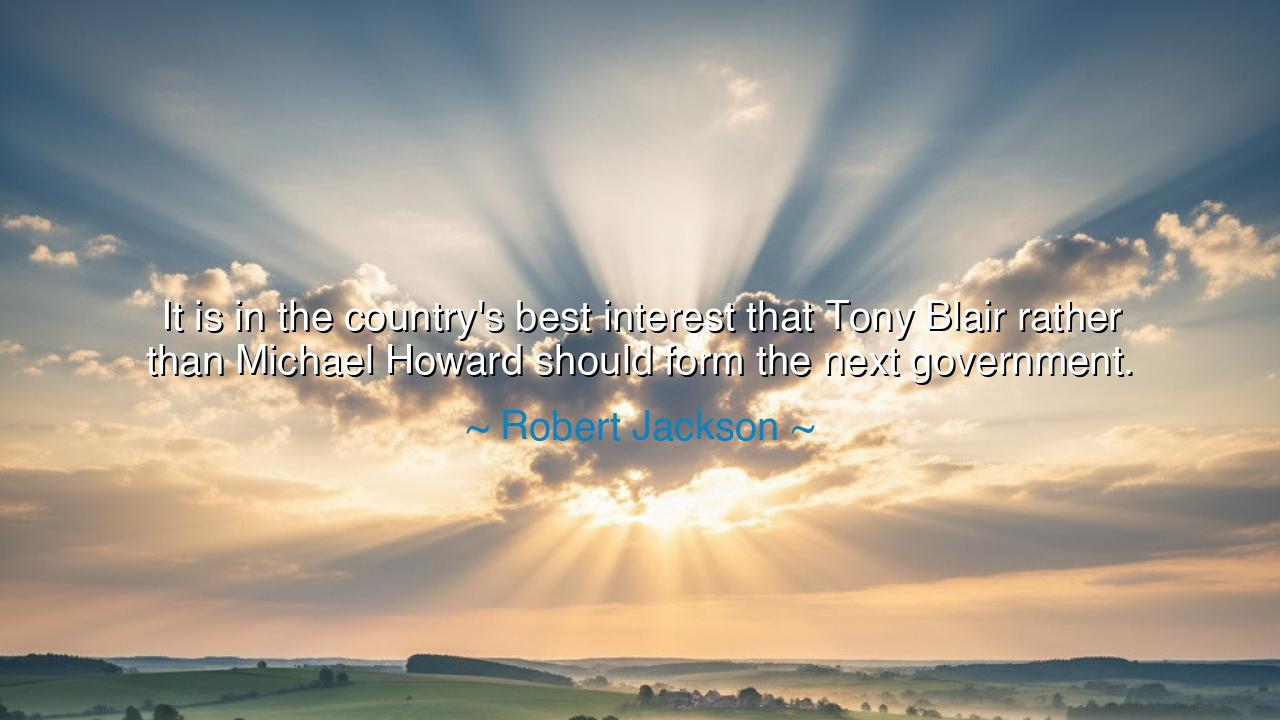
It is in the country's best interest that Tony Blair rather than
It is in the country's best interest that Tony Blair rather than Michael Howard should form the next government.






In the age of great political contests, when the heart of a nation trembles between paths of promise and peril, a man named Robert Jackson, once a loyal Conservative, spoke with candor that startled both friend and foe. He said: “It is in the country's best interest that Tony Blair rather than Michael Howard should form the next government.” These words were not the cry of a partisan, but the confession of a patriot. They carried the weight of conscience over allegiance, and in them resounds one of the oldest truths known to civilization—that the highest loyalty is not to party, nor tribe, nor faction, but to the nation itself.
For in every democracy, there comes a time when the people must look beyond banners and slogans, and see with the eyes of wisdom. Jackson’s statement, made in the years before the British election of 2005, was no small betrayal in the eyes of his peers. As a long-serving member of the Conservative Party, he broke ranks to declare his support for Tony Blair, the Labour Prime Minister. Why? Because he believed that the moment demanded continuity, steadiness, and international leadership over the shifting promises of partisan renewal. It was a moment when Britain faced the echoes of war in Iraq, the pressures of Europe, and the uncertainty of a changing world. Jackson, placing country above creed, chose the harder path—to stand for what he thought right, not for what was comfortable.
The ancients knew such courage well. In the Athenian republic, it was said that the truest citizen was not he who cheered the loudest for his faction, but he who dared to oppose it when it strayed from justice. Consider Marcus Brutus in the last days of the Roman Republic, torn between loyalty to Caesar and devotion to the Republic itself. His heart broke as he chose the people’s freedom over friendship, and though history’s judgment upon him remains divided, his choice remains a symbol of that sacred struggle between loyalty to men and loyalty to principle. Robert Jackson, though in a gentler arena, walked a similar path: he placed the wellbeing of Britain—the integrity of governance—above the demands of his political tribe.
In his declaration lies a profound lesson about the nature of leadership and responsibility. A nation does not thrive when its people or its leaders cling to party above truth. The health of the republic depends on the capacity of its citizens to discern not what is most advantageous for their group, but what is most righteous for all. Jackson saw in Tony Blair—despite controversy, despite fatigue—a steadiness that he believed could carry the country forward. He was not blind to error; he simply judged that continuity, in that hour, served Britain’s interests better than change. Such discernment is the mark of a mature mind: the ability to see beyond emotion to the deeper patterns that sustain the state.
History is replete with examples where loyalty blinded nations to truth. In the waning days of the Weimar Republic, too many clung to their factions while the fabric of democracy unraveled before them. In Rome, senators once valued power over peace, until their divisions gave birth to tyranny. But there are brighter examples too—moments when men and women placed the common good above self or party. Winston Churchill, though scorned by his own party in the 1930s, spoke relentlessly of the danger of appeasement, not for glory, but for Britain’s survival. And when war came, his foresight saved a nation. Such is the lineage of Jackson’s courage: the quiet heroism of those who think not of loyalty’s comfort, but of truth’s burden.
The meaning of Jackson’s words is therefore both political and moral. He reminds us that principle must rule over allegiance, and that the health of democracy lies in the willingness of its citizens to disagree with their own side when conscience demands it. The “country’s best interest” is not a slogan; it is the sacred trust of all who govern and all who vote. When we forget this, when we make politics a game of tribes rather than a forum of reason, we descend into what the ancients called stasis—the sickness of the state, where division replaces duty and victory replaces virtue.
So let this be the lesson for all who walk in the world of ideas and action: be not enslaved to sides, but servants of truth. When the time comes to choose, ask not, “What benefits my party?” but, “What strengthens the nation?” Speak with courage, as Robert Jackson did, even when your words isolate you. For the true patriot is not the one who shouts the loudest for his faction, but the one who guards the common good when all others forget.
And thus, remember: a government, like a ship, must be steered not by pride, but by prudence. Leaders may come and go, but the nation endures. When faced with division, may we all, like Jackson, have the wisdom to see beyond the banners—and the courage to say, with clear heart and steady hand, that the best interest of the country must forever stand above all else.






AAdministratorAdministrator
Welcome, honored guests. Please leave a comment, we will respond soon